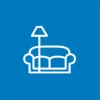Switzerland is home to some of the world’s most valuable real estate. It isn’t uncommon for Swiss homeowners to have a fortune of between 500,000 and 1 million francs tied up in a home which they either inherited or paid off over their working life.
However, many Swiss pensioners find that their lower income after retirement no longer meets affordability requirements, putting their mortgage (and therefore their home) at risk. Additionally, many people find that their retirement savings and pensions alone do not provide enough income to meet the increasing cost of living.
A reverse mortgage, sometimes referred to as a lump-sum mortgage or a real estate pension in Switzerland, can provide a solution. Although this type of mortgage has been available in the United States and other countries for several decades, they are not yet widely known or understood in Switzerland.
What is a reverse mortgage?
In a reverse mortgage, the mortgagee (a bank, insurance company or pension fund) gives you a loan secured by equity in your property, as with other mortgage types.
The difference is that the interest charges of a reverse mortgage are deducted from the loan rather than charged in addition to the loan. Because the lender receives the full interest on the loan right from the start, you as the borrower do not need to make any ongoing interest payments on the mortgage and you do not need to meet affordability requirements.
This makes reverse mortgages a useful tool for homeowners who want to convert equity in their home into liquid assets, but are not able to meet affordability criteria set forth by lenders. Pensioners – who normally are not considered for standard mortgages – can obtain reverse mortgages because there is no risk of their defaulting on interest payments as these are paid upfront using part of the loan.
Your home still belongs to you, but your equity in the property is lower. You can continue to live in your home and can leave it to your heirs, but less of your home belongs to you (or to your heirs) and more of it belongs to the bank.
Example: You own a mortgaged home with a collateral value of 1 million Swiss francs and have paid off 800,000 francs of the mortgage – meaning that you have 80 percent equity in your home. You want to convert part of the equity in your home into liquid assets for living expenses and investments, but you do not meet affordability requirements for standard mortgages.
Using a 10-year reverse mortgage, you pledge half of your equity in the property – 40 percent of the home’s collateral value – to a bank in exchange for a 400,000-franc loan. The bank also refinances the additional 20 percent which was held by your previous mortgagee, bringing your total mortgage up to 600,000 francs. The bank subtracts the total interest for the full 10-year term. In this case the 2 percent annual interest charge adds up to around 12,000 francs per year or 120,000 francs total. 200,000 francs of the loan go to refinance the 20 percent owed for your existing mortgage, so you receive 280,000 francs.
Which Swiss mortgage providers offer reverse mortgages?
The relatively low number of Swiss banks, insurance companies and pension funds which provide reverse mortgages shows that this market is still in its fledgling stages.
- Bank Sparhafen Zürich. The reverse mortgage provided by this bank is branded “Hypothek 50+”. Up to 65 percent of your home’s collateral value can be mortgaged with no amortization obligation. Interest on the mortgage is charged on a regular basis as with a standard mortgage, rather than deducted as a lump sum.
- Bank Zimmerberg. This regional bank in the Canton of Zurich provides a reverse mortgage in the form of a lump-sum mortgage (German: Pauschalhypothek). Homeowners must have reached legal retirement age in order to be eligible. You can mortgage up to 65 percent of your home’s collateral value. A minimum mortgage of 300,000 francs is required. The property's collateral value must be 1 million francs or more. Mortgage terms range between 5 and 10 years.
- Bezirks-Sparkasse Dielsdorf. This regional bank provides a reverse mortgage which it calls a “senior mortgage”. These mortgages (minimum 100,000 francs) are available to homeowners age 65 or older. You can receive the money paid out for your equity either as regular, recurring payouts, or as a lump sum.
- Thurgauer Kantonalbank. The Immo-Rente reverse fixed-rate mortgage from the cantonal bank of Thurgau is available to homeowners aged 60 or older. Mortgage terms can be between 5 and 15 years. Up to 66 percent of the property's collateral value can be mortgaged. You can choose to have the loan paid out in a lump sum, or in monthly installments. The full amount of interest owed is deducted as a lump sum and held in a blocked account.
- Vermögenszentrum (VZ). The Immo-Rente reverse mortgage offered by this countrywide financial consultant is actually provided by homeowners association HEV Schweiz. It is available to owners of good quality homes with a value of 1 million francs or more. To be eligible, homeowners must have at least 80 percent equity in the property. Up to 65 percent of your home’s collateral value can be mortgaged. Mortgage terms range from 10 to 15 years.
When is getting a reverse mortgage a smart financial move?
- You need supplementary income to supplement your pensions after retirement. If you own a property but need more money to fund your retirement, a reverse mortgage can provide you with extra income without your having to sell your home.
- You risk losing your home due to changes in your income. If you become unemployed or are unable to earn your regular income due to illness or an accident, refinancing your home with a reverse mortgage can help you avoid a mortgage foreclosure or forced sale. Living in a property you own is often more affordable than renting a home, even taking mortgage costs into account. You can use the moneyland.ch rent or buy calculator to find out if a rental would work out cheaper.
- You want to make gifts to your heirs in the form of money rather than equity in a property. There are many reasons why your children or other heirs might benefit from money well ahead of your passing away. For example, you may want to invest in your child’s or grandchild’s education or in the down-payment for their own home. Or you may simply want to gift your loved ones money to enjoy while they are still young. A reverse mortgage can provide a large amount of money without a complete sale of your home.
- You want more of your assets to be liquid rather than tied up in a property. There are scenarios in which having liquid cash assets can be more beneficial than holding equity in a single property. For example, you may want to purchase a second property to rent out or you may need money to invest in your business. If you are sure that your money can reap higher dividends through other investment channels than what you pay in interest charges, a reverse mortgage can provide a tool to free up your assets.
- You do not want to leave the bulk of your wealth to your legal heirs. Swiss inheritance laws clearly stipulate who get what when you pass on (see our basic guide to Swiss inheritance law for more on this). If you want to gift a large part of the wealth which is tied up in your home to someone other than your legal heirs (to a close friend, companion, or charitable cause, for example), a reverse mortgage can facilitate this. While your legal heirs can dispute gifts made very shortly before your death, your money is generally yours to do with as you please.
Are there any drawbacks to reverse mortgages?
The primary drawback of reverse mortgages in Switzerland is that they are only offered by a handful of financial services providers. That means you have a limited number of mortgages to choose from, and may not necessarily get the best mortgage rates.
It is also important to understand that the larger the mortgage you get, the more interest you pay. While it can be tempting to give up the largest possible amount of home equity in exchange for the highest possible payout, you should treat a reverse mortgage as you would treat any other loan. Carefully consider how much money you really need or want. The smaller the mortgage, the less you will spend on interest.
The term you choose is also important. If you are looking for a short-term solution to fill a financial gap (if you are temporarily unemployed, for example), a 5-year reverse mortgage may work fine. If you are getting a reverse mortgage to keep you in house and home throughout your retirement, a long-term mortgage might make more sense. As with most loans, the longer the term, the more interest you pay.
Whether the mortgagee deducts the interest on the mortgage as a lump sum or from recurring payouts (as applicable) can also determine the full cost of a reverse mortgage. Having the entire cost of the mortgage deducted right at the start of the mortgage term saves hassles and provides peace of mind, compared to paying just the annual interest every year. But paying the interest in installments allows you to hold a portion of the money owed and earn interest on it across the mortgage term.
Using the example above: If the bank deducted 12,000 francs of interest every year in the 10-year term rather than deducting the full 120,000 at the start, you could earn around 1100 francs of interest on the balance over the 10 years (based on 0.2 percent interest per annum).
More on this topic:
Swiss mortgage comparison
Mortgages in retirement: the forced sale nightmare












